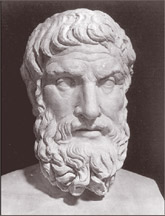Is philosophy what philosophers do?
The greater philosopher a man is, the more
difficult it is for him to answer the foolish questions of common
people.
- Henryk Sienkiewicz (1846 – 1916)
 What is philosophy? Who is a philosopher? Such questions still remain
to be answered satisfactorily. However, there have been a string of
philosophers starting from Socrates, Plato and Aristotle who lived in
the sixth century BC up to Bertrand Russell and Jiddu Krishnamurti who
changed the course of history with their penetrating wisdom. With the
rapid advancement of science and technology, the study of philosophy has
taken a backseat in universities. One major reason for this trend is
that philosophy does not help anyone to amass wealth or enjoy material
benefits in a consumerist world. What is philosophy? Who is a philosopher? Such questions still remain
to be answered satisfactorily. However, there have been a string of
philosophers starting from Socrates, Plato and Aristotle who lived in
the sixth century BC up to Bertrand Russell and Jiddu Krishnamurti who
changed the course of history with their penetrating wisdom. With the
rapid advancement of science and technology, the study of philosophy has
taken a backseat in universities. One major reason for this trend is
that philosophy does not help anyone to amass wealth or enjoy material
benefits in a consumerist world.
Philosophy and theology have a close affinity from time immemorial.
Once a philosopher and a theologian were engaged in a dispute. The
theologian used the old quip about a philosopher resembling a blind man
in a dark room, looking for a black cat - which wasn't there. “That may
be,” said the philosopher, “but a theologian would have found it.”
Philosophy, like theology, is an abstract subject which can be mastered
only by a person with stamina for hard work and a neocortex or a highly
developed thinking brain.
In the Digital Age we are living in, people pay scant attention to
the study of philosophy. However, even before the birth of Jesus Christ,
people had understood the importance of philosophy to life. The noted
Greek philosopher Epicurus (341 - 270 BC) said that no one, whether
young or old, should delay the study of philosophy because it is never
too early or too late to do so. According to him, a person should study
philosophy to secure the health of his soul. And the man who says that
the age of philosophy has either not come or has gone by is like the man
who says that the age of happiness is not yet come to him or has passed
away.
Greek philosophy
|

Epicurus: No one should delay the study of philosophy |
Greek philosophers thought that when a man studies philosophy, he
will remain young in blessings through the grateful recollections of
what has been. Even when he grows old, he will know no fear of what is
to come. In other words, he will have no fear of debilitating diseases
and death.
The study of philosophy has not undergone any drastic changes over
the centuries. In ancient Greece, philosophers tried to answer questions
such as, “Who am I?” or “What is the nature of the world we inhabit?”
Although Greek philosophers made far-reaching discoveries about the
external world (physics and biology), the social world (ethics and
politics) and the mind (psychology) without drawing strict boundaries,
even modern philosophers try to answer the same questions! That is the
nature of philosophy.
Despite its highly abstract nature, man's quest to understand what
philosophy is has not ended. Once a man and a woman set out to discover
philosophy. For many years they wandered through many lands and asked
the people they met, “What's this wisdom you call philosophy?” They also
wanted to know how philosophy was practised in different countries. They
finally asked, “Why do you do philosophy?” They did not get complete
answers to their questions. However, before their death they discovered
that the patient labyrinth of lines that they had gathered traced the
lineaments of their politics, science and country. They also reflected
the people's well-being, their professions and their limitations.
Mysterious subject
Philosophy still remains a mysterious subject because it embraces a
wide variety of human experiences. Its more traditional areas include
ethics, logic, aesthetics and metaphysics. Today, we can study the
philosophy of science, philosophy of literature, philosophy of politics
and philosophy of law, popularly known as jurisprudence.
There are also numerous philosophies coming from different places.
Most universities teach Indian philosophy, Jewish philosophy and
Buddhist philosophy. In times to come, philosophy will branch itself off
to different other areas.
Despite its highly abstract nature, philosophy is not without its own
merits. For instance, philosophy can pose intellectual questions and
puzzles, solve logical problems, and provide a clear analysis of a range
of topics. What is more, philosophy is concerned with the well-being of
the people. Philosophers are trying to find sources of human suffering
and frustrations. If not for the philosophers, there would be no one to
pinpoint the errors of our thinking and the futility of our mundane
desires. Only philosophy can open up fresh perspectives on our pressing
problems.
Purpose
In the modern world, unlike in ancient Greece, philosophy has become
a profession. There are separate faculties for philosophy at
universities with lecturers and professors. Once a local newspaper
carried a feature about five leading philosophers in Sri Lanka. Readers,
however, found that the so-called philosophers were either lecturers or
professors of philosophy! It is questionable whether we have produced
any philosopher who can be compared with Plato or Bertrand Russell.
The Hellenistic School of Philosophy considered the fundamental
purpose of philosophy to be that of maintaining inner peace and
tranquillity in a confusing and often chaotic world. The statement is
valid even today.
|

